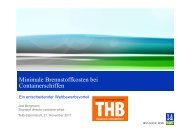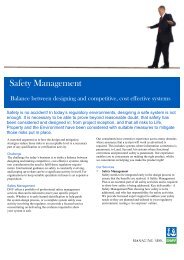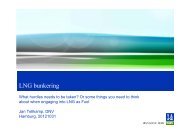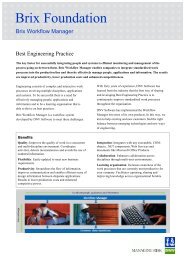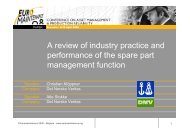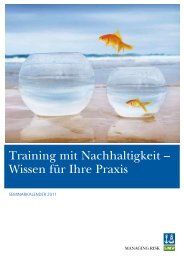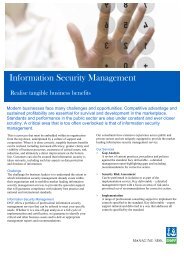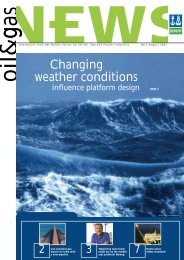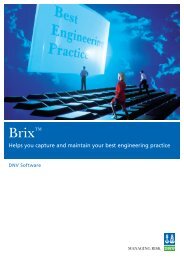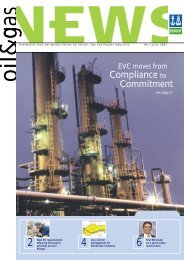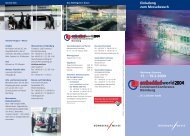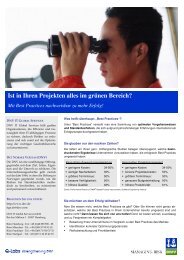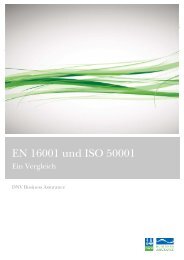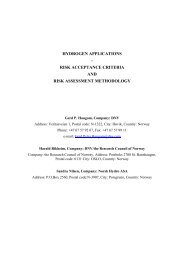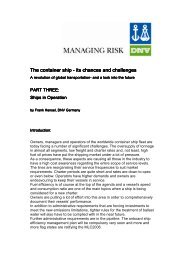EUROMAINTENANCE JOURNAL - DNV Germany
EUROMAINTENANCE JOURNAL - DNV Germany
EUROMAINTENANCE JOURNAL - DNV Germany
You also want an ePaper? Increase the reach of your titles
YUMPU automatically turns print PDFs into web optimized ePapers that Google loves.
well as the follow-up of the progress. In<br />
addition, we pre-commissioned new system<br />
components.<br />
Moreover, our people offered support with<br />
tie-ins and the implementation of adjustments<br />
to static equipment. They were also<br />
given the supervision in catalytic exchange<br />
and the cleanup work. In other words: we<br />
became a major link between production<br />
on the one hand and the global executing<br />
contractor on the other”.<br />
Punching<br />
The punching of new line systems has an<br />
administrative and a construction angle<br />
to it. Bakelants explains: “In the administrative<br />
punch, our specialists check issues<br />
such as the fl ow direction, the line’s<br />
gradient, the drainage and bleeding options,<br />
etc. They also check for errors: errors<br />
between the isometrics (+/- 4,000)<br />
and the P&ID (process- and instrumentation<br />
diagram). Moreover, we must check<br />
whether or not the lines are drawn according<br />
to the appropriate line specifi -<br />
cations.” The construction punch, or the<br />
actual acceptance, follows as soon as<br />
the administrative punch is completed. In<br />
this phase, the experts of Profs for Industry,<br />
together with those responsible for<br />
the production and the contractor, accept<br />
the various line parts prior to printing the<br />
line. A punch list with A, B and C items is<br />
drawn up after each acceptance.<br />
Pre-commissioning<br />
In order to make work manageable,<br />
Profs for Industry subdivided the abovementioned<br />
expansion project into 150<br />
packages of work. A folder was created<br />
for each work package. The folder<br />
contained a sketch of the location, the<br />
required PID schemes, the isometrics,<br />
the technical data sheets of the systems<br />
and the punch lists. “As Profs for Industry<br />
we were given the authority to rinse<br />
the line system, to check for cleanness<br />
and to subsequently sign for acceptance.<br />
Also, we had to supervise the assembly<br />
of the components which had been disassembled<br />
for the pre-commissioning.”<br />
“It is worth mentioning that both BASF as<br />
well as the global executing contractor<br />
were happy to use the work packages<br />
that our organisation had compiled,”<br />
says Bakelants.<br />
‘Tie ins’<br />
Yet another substantial assignment consisted<br />
in producing the approx. 1,800<br />
so-called ‘tie ins’ during the maintenance<br />
stop. In order to make this happen in a<br />
structured manner, an expert of Profs for<br />
Industry was present at all meetings regarding<br />
the ‘tie ins’. During the meetings,<br />
a decision model was utilized to determine<br />
how the system had to be isolated<br />
in order to be able to rinse it. At these<br />
meetings, it was also decided whether<br />
they had to make hot or cold cuts. From<br />
each ‘tie in’, a separate meeting report<br />
was drawn up and included in the work<br />
result. All of the steps that were necessary<br />
within the Primavera maintenance<br />
system were included in this report.<br />
Through this approach, the engineering<br />
fi rm had to work according to the system<br />
of BASF. In preparation of the shutdown,<br />
Profs for Industry, therefore, created the<br />
job folders for the engineering fi rm with<br />
the total work preparation per ‘tie in’.<br />
n During major projects such as a shutdown,<br />
screening of personnel and cooperation<br />
is of critical importance.<br />
These work folders contained a P&ID, a<br />
photograph, isometrics, a fl ow diagram,<br />
etc. The job folders were extremely useful<br />
for the engineering fi rm as well as for our<br />
own specialists. For they had to monitor<br />
progress during the shutdown and check<br />
the safety, explains Bakelants.<br />
Personnel<br />
Although Profs for Industry is daily involved<br />
in the abovementioned fi eld, it<br />
remains important to screen the employees<br />
prior to the start of each project.<br />
“We screen our people, but so does the<br />
customer,” enunciates Bakelants. We<br />
mainly screen a person’s background<br />
and his/her team spirit. Cooperation<br />
during such projects is quite important.<br />
“In order to make certain that our employees<br />
stay current at all times, during<br />
HIGHLIGHTS<br />
each toolbox meeting their knowledge is<br />
refreshed with a specifi c weekly theme.<br />
We strive to familiarize our employees<br />
with their new environment. We do this<br />
by offering them as many courses and<br />
training sessions as possible, such an<br />
internship week for the operators of<br />
our department. The courses and training<br />
sessions also serve as a great opportunity<br />
for people to get to know one<br />
another.”



